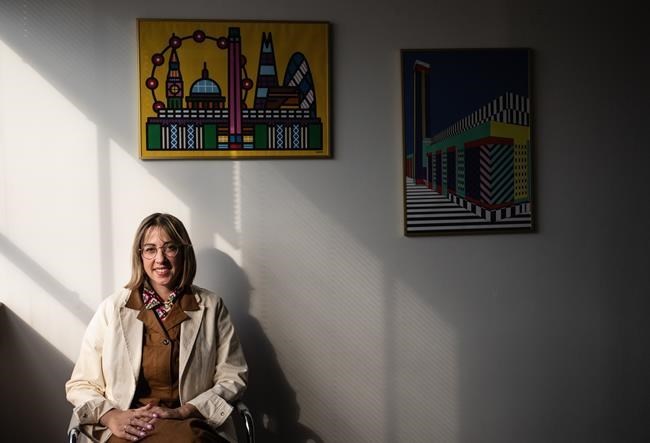Edmonton lawyer Melissa Bourgeois had been practicing family law for more than a decade when she had what she calls her "lightbulb moment."
After years of helping couples navigate amicable divorces — ones where spouses aren't actively fighting, but simply choosing to go their separate ways — Bourgeois heard about a unique legal service being offered in the U.K. There, low-conflict separating couples were being offered the opportunity to hire just one lawyer to act for both parties.
The concept at the time was untested in Canada, where conflict of interest rules have traditionally dictated that each divorcing spouse must retain their own lawyer, Bourgeois said.
But she suspected it could work here too.
"It just seemed to me really brilliant," she said. "I think what most couples today are looking for is a way to navigate the legal system, but in a way that helps them preserve a decent relationship with one another.
"It seemed like a really good way to help this sub-set of clients that I knew existed, anecdotally, from my traditional practice."
Around 38 per cent of marriages in Canada end in divorce, but just because divorce is common, that doesn't mean it's easy — or cheap.
According to a 2021 survey by Canadian Lawyer magazine, lawyers charge on average $1,860 in legal fees for an uncontested divorce, where couples agree both on the divorce and on the terms of separation. The process can take between four to six months, and still traditionally requires each spouse to hire their own independent legal counsel.
As soon as one spouse disagrees with the other on anything from who gets the house, to alimony, to child support, the divorce becomes a contested one.
In these cases, firms typically charge by the hour for every email, text or phone call required to get two warring spouses to an agreement. According to the Canadian Lawyer survey, the average fees charged for a contested divorce in Canada run an eye-watering $20,625.
But Bourgeois said in her experience, many couples actually want to set acrimony aside, if the outcome is a swifter and more cost-effective agreement. That's why she decided to seek permission from the Law Society of Alberta to offer what she calls her "one family, one lawyer, one fee" model as a first-of-its-kind-in-Canada pilot project.
That permission was granted at the end of 2021. Now up and running, her firm "One Family Law" has helped about 40 couples since January of this year untie the knot, with each couple paying a flat $5,000 fee for a start-to-finish process that takes no more than six to eight weeks.
One of those couples, Edmonton's Bryan Sali and his ex-wife, recently ended their 15-year marriage with Bourgeois' help.
"A separation and divorce doesn't need to ruin a family. We tell our daughter we still love each other, we just love each other differently," Sali said.
"Essentially what we wanted to avoid was lawyers 'doing their job' and forcing us to fight each other."
Sali said he's seen friends spend tens of thousands of dollars and waste multiple years hashing out their divorces through lawyers and the court system. Some of these friends, he added, said whatever goodwill they felt towards their former spouse evaporated as the proceedings dragged on and the bills mounted.
He said he's grateful he and his ex kept things as simple and amicable as possible.
"We certainly saved a lot of time and money by going at it this way," Sali said.
"But I'm pretty certain that we also saved our relationship as friends and co-parents."
Many divorcing couples won't be on the same page about everything, even if the decision to separate is mutual, said Kevin Caspersz, managing partner at Toronto-based family law firm Caspersz Chegini LLP.
"Given the concerns that we as lawyers always have with conflict of interest, if you're representing both sides of a matter, that's something you always have to keep in mind," he said.
However, he pointed out that even for those for whom a one-lawyer model isn't suitable, there are other ways to avoid the costs and stresses of traditional litigation.
Mediation, for example, involves working with a neutral third party who helps the spouses reach a mutually agreeable settlement that can then be taken back to each spouse's lawyer for independent legal advice.
"In any sort of family law matter, limiting conflict ... even limiting the emotion involved in the process, tends to smooth the path," Caspersz said.
"The more emotion that's involved, the harder and more expensive it is to deal with."
Bourgeois said any relationship where there is an obvious financial or power imbalance is not suited to a simplified, one-lawyer model.
Still, Bourgeois said she believes the majority of separating couples today genuinely want to make the best of a stressful situation so that they can move forward with minimal financial and emotional scars.
In many cases, the spouses still plan to be parents together and simply need help navigating the legal system to make their plan official.
"Certainly there are different options available to people now that are not traditional litigation that takes years and years and hundreds of thousands of dollars," she said.
"That's been a really big shift. I think going forward most people really just want to find a way to co-parent in a healthy way."
This report by The Canadian Press was first published Sept. 14, 2023.
Amanda Stephenson, The Canadian Press



